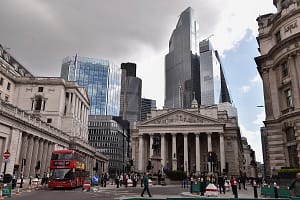The Bank of England (BoE) has raised interest rates to a 14 year high in the ninth consecutive rise in an attempt to tackle inflation.
The monetary policy committee (MPC) made the decision to raise the bank rate to 3.5% from 3% even though inflation ease in November.
The slow down in the rate of inflation was “not sufficient” to prevent the bank raising interest rates by 0.5%.
Most of the MPC’s nine members warned that they will continue to vote for rate rises if the economy continues to develop as they are expecteing.
The BoE said, “The majority of the committee judged that, should the economy evolve broadly in line with the November Monetary Policy Report projections, further increases in Bank rate might be required for a sustainable return of inflation to target.”
Two MPC members had voted for rates to remain unchanged at 3%, arguing, “The real economy remained weak, as a result of falling real incomes and tighter financial controls.
“There were increasing signs that the downturn was starting to affect the labour market. But the lags in the effects of monetary policy meant that sizeable impacts from past rate increases were still to come through.”
Federation of Small Businesses (FSB) National Chair Martin McTague said, “Today’s rise in the base rate was widely predicted, but there is also a sense in the air that the decision to go for an increase – with today’s the ninth in a row – may be less of a one-way bet in coming months.
“This time last year, the base rate was just 0.1%. The precipitous climb in borrowing costs in under 12 months has hit small firms hard, eroding their margins at a time when many are struggling with the very cost increases which prompted the Bank of England to increase the rate in the first place.
“Energy costs are by far the biggest driver of the inflation that businesses and consumers are experiencing, and interest rate increases are doing little to rein in energy bills, while making it harder for small firms to keep the lights on.
“SMEs are collectively carrying £33 billion extra in debt, much of it index-linked, compared to January 2020, before Covid hit. Every basis point increase means extra pressure for those on floating rates, and a disincentive to apply for finance for firms looking to grow and invest.
“Our Small Business Index found that in Q3, nearly two in five small firms applying for finance were offered a rate of 8% or higher, compared to a quarter of small firms in the same period in 2021.
“This was supposed to be the recovery period, where the economy got back into gear, with small firms providing the engine of growth. The cost of doing business crisis has knocked that plan off course, and many small businesses are wondering – amid strikes and disruption, near rock-bottom consumer confidence, and continued rises in input costs – how they will stay afloat.
“The Government’s forthcoming announcement on how it will support businesses once the Energy Bill Relief Scheme comes to an end must have a compelling offer for small firms, one in four of whom say they plan to close, downsize or restructure in the absence of a sufficient level of energy support after March.
“Many small businesses are struggling at the moment. They need certainty and support, to help them make the most of the festive season, and enter the new year in a spirit of optimism.”
Richard Singleton, finance director at accountancy firm, Menzies LLP, said, “The slight slowdown in the rate of inflation has not been sufficient to prevent the Bank of England from raising interest rates once again – this time by 0.5%.
“For businesses, this is going to increase the cost of borrowing further, at a time when many are desperately trying to stay cashflow positive. Throughout this year, businesses have been hit by wage inflation as well as energy and fuel cost hikes, and there is a prospect of more to come.
“Many business owners will feel unable to take a break this Christmas as they must be ready to hit the ground running in the New Year.
“Using cashflow modelling to take account of cost volatility, and scenario planning for the first quarter of 2023, is now vital. Looking further ahead, we must hope that when demand slows after the festive season, we might start to see inflation coming under control.”






Leave a Comment